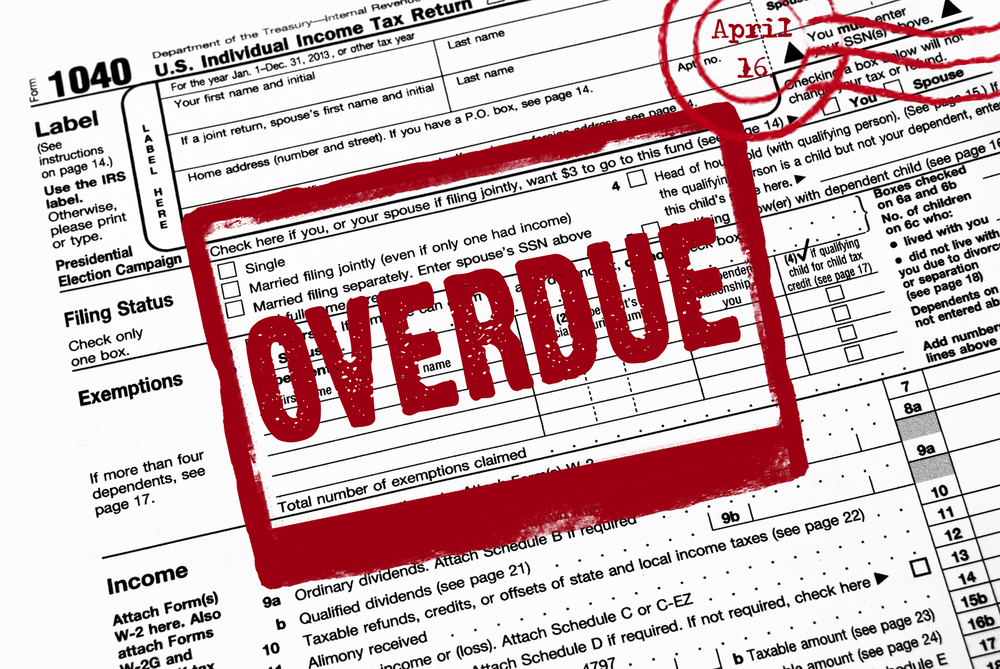What Are the Consequences of Having Overdue Taxes?
- Mar 15, 2022
 With hundreds of millions of taxpayers out there, many people think that the IRS won’t notice one unfiled return or one person’s overdue taxes. And, for a little while, that might be true. However, it is only a matter of time before you’ll receive a notice from the IRS about your taxes, and then, you’ll start to see consequences pretty quickly. What are the possible consequences of having overdue taxes? Keep reading to find out.
With hundreds of millions of taxpayers out there, many people think that the IRS won’t notice one unfiled return or one person’s overdue taxes. And, for a little while, that might be true. However, it is only a matter of time before you’ll receive a notice from the IRS about your taxes, and then, you’ll start to see consequences pretty quickly. What are the possible consequences of having overdue taxes? Keep reading to find out.
Wage Garnishment
If the IRS attempts to collect payment from you directly, and you don’t pay, they can take more aggressive routes to retrieving the taxes you owe. This can include garnishing your wages directly, which can cause financial difficulties for anyone. Generally, this will mean that they will take between 25% and 50% of your net income for each paycheck. Would you be able to get by with just half of your usual income? Most people wouldn’t. But if you leave your taxes unpaid, and the IRS determines that your income can support the payments, this is a distinct possibility.
Bank Levy
The IRS is privy to a great deal of your financial information, which can even include the funds in your bank account. If you have money in your accounts and you’re not making payments on your taxes, the IRS could take action by placing a levy on your bank account. They will send you a notice of this levy first, encouraging you to reach out and work on settling your tax debt. If you fail to respond to these notices, the IRS can simply withdraw the funds from your account. There is not a minimum amount that they must leave in your account, so they can legally withdraw up to the full amount that you owe—even if that means entirely draining your bank account.
Tax Liens
Don’t have much in terms of cash assets? The IRS can place a lien on your property instead, including your home, business, vehicles, and any other significant assets. Typically, this will not result in immediately forfeiting those assets. However, it can put a lot of pressure on you to settle your tax debts. If you continue to leave those debts unpaid, they can take action and end up foreclosing on your home or seizing your other property.
Revoked Passport
Do you have a passport? If you owe more than $53,000 in taxes or haven’t filed for several years, they could take that away from you. If you don’t travel all that much, this might not faze you. However, if you’re someone who enjoys travel or if you have to travel internationally for work on a regular basis, this could greatly disrupt your life. Imagine losing a big client because you can no longer travel to meet them like you promised, or try explaining to your sister why you suddenly can’t go to her destination wedding. Losing your passport can certainly be an unpleasant experience.
Trouble Getting a Loan
If you need a loan—for a mortgage, your business, or any other large investment—you’re going to have a hard time getting one if you owe the IRS money. For starters, if you don’t have any sort of payment plan set up with the IRS, any loan application you submit will be automatically denied. If you do get onto a payment plan, any potential lender will have to take those monthly payments into consideration when determining whether or not you can afford a monthly mortgage payment. This can still make it more difficult—thought not impossible—to get the loan that you need.
Growing Debt
Finally, it is always worth remembering that any debt to the IRS is not stagnant. It will continue to grow, accruing interest and penalties for every month that your debt is left unpaid. By the time the IRS takes serious collection measures against you, you’ll have a much larger debt to repay than your initial tax debt.
Work to Settle Your Debt Now
We understand that confronting your IRS tax debt can be difficult. However, it is always better to take action early, open a line of communication with the IRS, and take steps to settle your tax debt. The IRS offers many repayment options, including short-term payment plans, long-term installment plans, and offers in compromise. Additionally, if you’re genuinely unable to pay any amount on your tax debt right now, you can request to have your account placed in the “currently not collectible” status to cease all collection actions on your tax debt.
If you’re ready to start working to settle your taxes so you can minimize the impact these consequences have on your life, contact the IRS Advocates today.
STOP THE IRS!
Settle for less & Protect your assets
Never Call the IRS without Speaking with our Pros First!